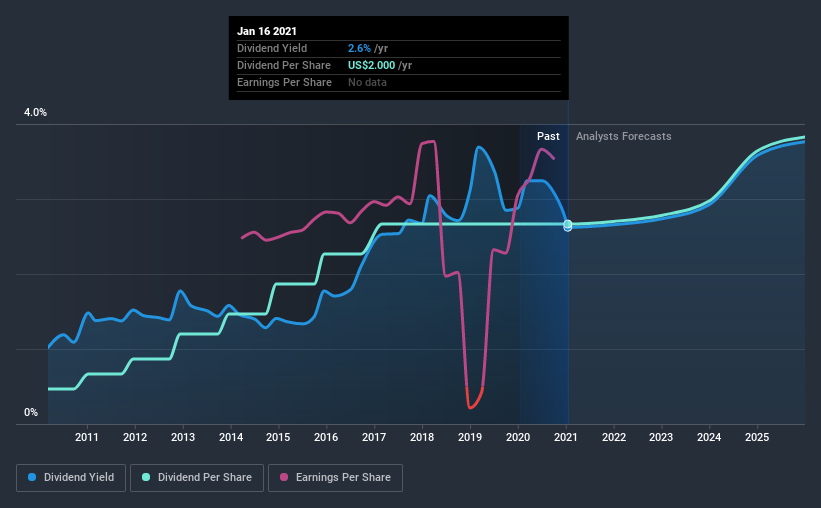Is It Smart To Buy CVS Health Corporation (NYSE:CVS) Before It Goes Ex-Dividend?
Some investors rely on dividends for growing their wealth, and if you're one of those dividend sleuths, you might be intrigued to know that CVS Health Corporation (NYSE:CVS) is about to go ex-dividend in just three days. Ex-dividend means that investors that purchase the stock on or after the 21st of January will not receive this dividend, which will be paid on the 1st of February.
CVS Health's next dividend payment will be US$0.50 per share, and in the last 12 months, the company paid a total of US$2.00 per share. Based on the last year's worth of payments, CVS Health has a trailing yield of 2.6% on the current stock price of $76.26. If you buy this business for its dividend, you should have an idea of whether CVS Health's dividend is reliable and sustainable. As a result, readers should always check whether CVS Health has been able to grow its dividends, or if the dividend might be cut.
View our latest analysis for CVS Health
If a company pays out more in dividends than it earned, then the dividend might become unsustainable - hardly an ideal situation. CVS Health paid out a comfortable 33% of its profit last year. Yet cash flows are even more important than profits for assessing a dividend, so we need to see if the company generated enough cash to pay its distribution. The good news is it paid out just 21% of its free cash flow in the last year.
It's positive to see that CVS Health's dividend is covered by both profits and cash flow, since this is generally a sign that the dividend is sustainable, and a lower payout ratio usually suggests a greater margin of safety before the dividend gets cut.
Click here to see the company's payout ratio, plus analyst estimates of its future dividends.
Have Earnings And Dividends Been Growing?
Stocks in companies that generate sustainable earnings growth often make the best dividend prospects, as it is easier to lift the dividend when earnings are rising. If business enters a downturn and the dividend is cut, the company could see its value fall precipitously. With that in mind, we're encouraged by the steady growth at CVS Health, with earnings per share up 8.8% on average over the last five years. Management have been reinvested more than half of the company's earnings within the business, and the company has been able to grow earnings with this retained capital. Organisations that reinvest heavily in themselves typically get stronger over time, which can bring attractive benefits such as stronger earnings and dividends.
Another key way to measure a company's dividend prospects is by measuring its historical rate of dividend growth. In the last 10 years, CVS Health has lifted its dividend by approximately 19% a year on average. It's encouraging to see the company lifting dividends while earnings are growing, suggesting at least some corporate interest in rewarding shareholders.
Final Takeaway
Has CVS Health got what it takes to maintain its dividend payments? Earnings per share growth has been growing somewhat, and CVS Health is paying out less than half its earnings and cash flow as dividends. This is interesting for a few reasons, as it suggests management may be reinvesting heavily in the business, but it also provides room to increase the dividend in time. We would prefer to see earnings growing faster, but the best dividend stocks over the long term typically combine significant earnings per share growth with a low payout ratio, and CVS Health is halfway there. There's a lot to like about CVS Health, and we would prioritise taking a closer look at it.
So while CVS Health looks good from a dividend perspective, it's always worthwhile being up to date with the risks involved in this stock. Case in point: We've spotted 2 warning signs for CVS Health you should be aware of.
We wouldn't recommend just buying the first dividend stock you see, though. Here's a list of interesting dividend stocks with a greater than 2% yield and an upcoming dividend.
This article by Simply Wall St is general in nature. It does not constitute a recommendation to buy or sell any stock, and does not take account of your objectives, or your financial situation. We aim to bring you long-term focused analysis driven by fundamental data. Note that our analysis may not factor in the latest price-sensitive company announcements or qualitative material. Simply Wall St has no position in any stocks mentioned.
Have feedback on this article? Concerned about the content? Get in touch with us directly. Alternatively, email editorial-team (at) simplywallst.com.

